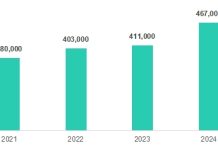
Global leader in health technology, Royal Philips and Indonesia’s private healthcare provider, Siloam Hospitals Group signed a Memorandum of Understanding (MoU) to advance artificial intelligence (AI) capabilities and development in the Indonesian healthcare sector.
The partnership also includes the Universitas Pelita Harapan (UPH) Medical Sciences Group to focus on capacity building, knowledge sharing and implementing advanced AI solutions.
“At Philips, we believe that informatics and AI will help transform healthcare by optimising workflows, improving efficiency and increasing capacity, making healthcare more accessible and delivering better care for more people,” said Royal Philips Chief Executive Officer, Roy Jakobs.
Meanwhile, Siloam Hospitals Group Deputy President Director, Caroline Riady commented, “By investing in AI capability and sharing global expertise, we are helping to build a smarter, more efficient healthcare system that will benefit millions of Indonesians and support the national healthcare agenda.”
The partnership will focus on key areas such as AI-driven clinical care, global knowledge sharing with Philips, digital health transformation, supporting the Indonesian government’s healthcare goals as well as expertise sharing to drive environmental, social and governance (ESG) in healthcare.
Leveraging on Philips’ AI innovations, the collaboration will help transform clinical care and digital health, enhance healthcare delivery and make the healthcare infrastructure more sustainable, with the goal of delivering better care for more people in Indonesia.
In addition, the partnership aligns with the Indonesian government’s healthcare strategy to improve healthcare accessibility, enhance clinical outcomes and embrace digital transformation.
In an article by Monash University, Indonesia, it was mentioned that the country should promptly establish integrated health data governance in the age of AI, by mainly focusing on ensuring quality standards for health data collection, validation and maintenance, protecting patient privacy while guaranteeing ethical data use as well as supporting the comprehensive integration of various data types for AI models.
Health data governance also plays a crucial role in addressing potential biases in AI. Through careful planning and collection of health data, errors in data can be identified and minimised.
This also presents a challenge for the nation as Indonesia is a country with a large and diverse population with varied natural conditions, which requires a comprehensive framework to build robust health data governance.
This includes establishing clear roles in data collection, data quality standards, data sharing regulations, patient privacy protection, health ethics guidelines, patient engagement mechanisms, and audit and quality assurance processes.
Given the large number of regions in Indonesia, the provision of supporting facilities, such as internet access, may need to be done gradually, with the collaboration between Philips and Siloam Hospitals being a good example.














